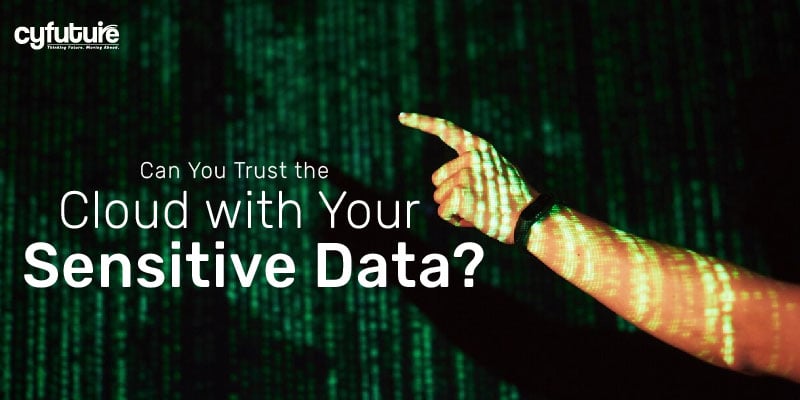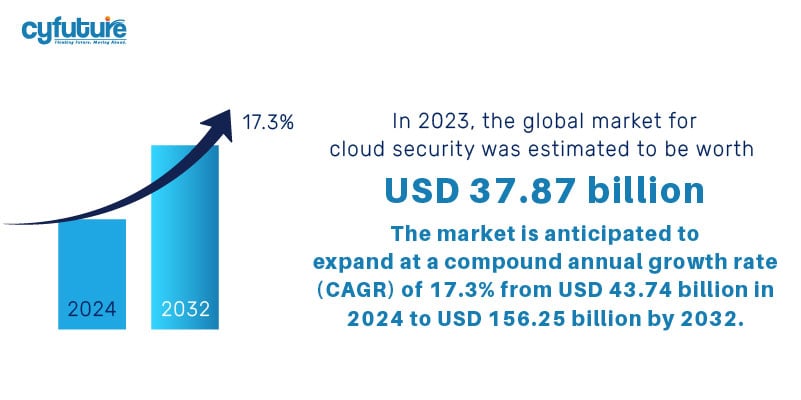-
Get Cloud GPU Server - Register Now!
Toggle navigation

Cloud computing has emerged as a key component of modern business operations. Furthermore, almost all businesses, from start-ups to large multinationals, are using the cloud for data management, processing, and storage.
In fact, in 2023, the global market for cloud security was estimated to be worth USD 37.87 billion. The market is anticipated to expand at a compound annual growth rate (CAGR) of 17.3% from USD 43.74 billion in 2024 to USD 156.25 billion by 2032.

However, as cloud services become an essential part of the digital ecosystem, one critical question arises: Can you trust the cloud with your sensitive data?
With cyberattacks becoming more sophisticated, and data breaches more common, organizations face a paradox. They need the cloud’s scalability and convenience, but at what cost to their security?
Most people associate the cloud with cost-effectiveness, scalability, and ease. However, strong security becomes crucial when working with sensitive data, such as financial records, intellectual property, or personal information. Does the danger outweigh the advantages, or is the cloud secure enough to hold this much data?
In this comprehensive article piece, we’ll look at the security frameworks in place, discuss the challenges of entrusting the cloud with your sensitive data, and explain how cloud security services may help protect your priceless assets. Now, let’s delve into the deep knowledge pool!
Addressing the trust issue requires an understanding of cloud security services. Cloud Security Services is an important component for businesses and individuals choosing the cloud, ensuring sensitive data is kept safe. Identity and access management (IAM) and others, including advanced encryption algorithms that protect at rest and in motion, are included within these services. With the help of cloud security, users have protection against cyber attacks, such as phishing, malware, and ransomware attacks, targeting cloud-hosted data.
Machine learning and artificial intelligence have made cloud security much more evolved, where it now plays the role of an intelligent agent in threat detection and response. The services provide real-time automated monitoring, so suspicious activities are identified in real-time, thus providing a more proactive approach to security than possible from traditional systems.
Cloud security services are many times supplied with compliance certifications, and therefore, providers are bound to achieve that global level protection regarding data, especially for sensitive information in personal or financial data handling business industries.
To confront such issues, cloud service providers have taken the insecurity measures to a newer level. Most of them come with very solid Cloud Security Services that will guarantee the protection of both internally and externally threatening data. They usually include:
Data is encrypted both when it’s resting (i.e., stored) and in transit. This means even if hackers intercept the data, without the decryption keys, they cannot read it.
This additional layer of security ensures that people have two or more verification factors to use while getting access to their information, such as a password and a one-time password sent to the phone. This way, even if login credentials are obtained through hacking, there is still a possible restriction against unwanted access.
Cloud service providers conduct regular internal and external security audits to always keep their infrastructure under the most recent security standards.
Users can control who has access to their data and what roles have what permission level. It means they don’t expose their critical information and, therefore, keep it confidential within the organization.
Cloud service providers spend enormous sums on protecting their infrastructure, yet the cloud is not risk-free. Data breaches, insider attacks, and weaknesses in software can provide routes into sensitive data for attackers. A breach of a third-party provider’s security can be devastating, as demonstrated by a few high-profile instances.
In the past, hackers have breached many layers of cloud infrastructure to capture sensitive data. Sometimes, in such hacking incidents, the data of thousands or millions of users was exposed to various identity thefts, financial frauds, or worse.
Cloud providers are entrusted with the holding and storage of massive amounts of data, and, unfortunately, some breaches can come from within. Employers or contractors that have access to sensitive information could potentially misuse their access or cause damage unintentionally. This remains one of the toughest risks to manage because it usually entails a trusted party with authorized access.

Various jurisdictions and industries have different regulations and laws regarding the data or information. Businesses deal with multiple jurisdictions, thus making it troublesome to collaborate and keep up with various regulations about hosting data on a global cloud. This lack of clarity in terms of where data is stored or managed can lead to non-compliance, which can result in handsome fines or even legal trouble.
While cloud providers are responsible for safeguarding the infrastructure, users must adopt best practices to ensure the safety of their sensitive data. Here are some best practices to consider:
The foundation of cloud security begins with choosing a reputable provider. Major players such as Amazon Web Services (AWS), Microsoft Azure, and Google Cloud offer industry-leading security measures, but even within these, it’s essential to evaluate their specific offerings based on your security needs.
Even if your cloud provider offers encryption, ensure that your data is encrypted before it enters the cloud. End-to-end encryption can ensure that only authorized parties can access and decrypt sensitive information.
Not everyone in your organization should have unrestricted access to sensitive data. By setting strict access controls, you can minimize the chances of unauthorized access and reduce the impact of any internal threats.
Even with redundancy features in place, it’s wise to maintain regular backups of your sensitive data. This backup should be stored in a different location to ensure that your data is protected in case of a disaster.
Ensure that your cloud provider adheres to the compliance standards relevant to your industry. Whether it’s financial, healthcare, or legal data, each type of data is subject to different privacy regulations, and your provider should help you navigate these rules.
The most compelling reasons for businesses’ shifting to the cloud include flexibility, rapid scalability, and innovation. Cloud migration, however, poses its own set of challenges; foremost is guaranteeing the security of data while migrating.
Cloud Migration Services are somewhat of a double-edged sword when it comes to confidential data. These services that could help migrate the business infrastructure from the on-premise environment to the cloud expose data in the process of migration. If one does not properly manage the process of migration, then confidential information may get intercepted or mishandled.
Therefore, a secure migration calls for collaboration between reputable service providers who have an all-inclusive strategy and strong migration, containing encrypted data transfers, proper access controls, and testing phases to identify vulnerabilities. Proper planning and a good migration framework translate to diminished risks in a transition.
With the evolution of the cloud, it is no wonder that the security measures of data will evolve with it. Concepts like artificial intelligence (AI) and machine learning (ML) are now used to detect threats faster than before. Integration of blockchain technology in cloud services is starting to become in demand, thereby enhancing the transparency and integrity of the data.
With the increased sophistication of cyber threats, businesses must stay ahead of the curve. Partnering with the leading cloud security services providers can aid companies in ensuring that their firms are always equipped to deal with risks associated with cloud computing.
Conclusively, the cloud offers immense benefits on one hand and tremendous risks on the other, especially when sensitive data is concerned. While Cloud Security Services continue improving, the risks of data breaches, insider threats, and non-compliance must not be ignored. To trust the cloud with your sensitive data completely, you must carefully assess your cloud provider, understand your shared responsibility model, and implement best practices to protect your data at every stage.
Not one-size-fits-all, businesses will need professional Cloud Migration Services providers to ensure that their sensitive data gets safely transitioned. With the proactive approach towards security as well as using advanced services in the cloud, risks get mitigated and all the conceivable benefits of going for the cloud are enjoyed.
Indeed, ultimately, yes you can entrust the cloud with your sensitive data. But only if the steps to protect it are taken in advance.